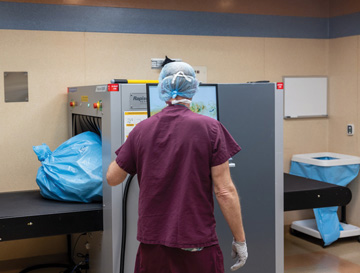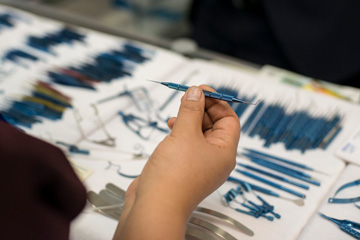Hospital's airport-style scanning process saves $35,000 worth of surgical tools from OR trash.
 LAST CALL An airport-style security scanner at University of Iowa Hospitals & Clinics is saving tens of thousands of dollars' worth of valuable instruments from accidentally entering the waste stream. |
WWU - Peter Leßmann
LAST CALL An airport-style security scanner at University of Iowa Hospitals & Clinics is saving tens of thousands of dollars' worth of valuable instruments from accidentally entering the waste stream. |
WWU - Peter Leßmann
By nature of their size, microsurgical instruments are more likely to get lost in the shuffle of OR turnovers than larger instruments. In a worst case scenario, they might be accidentally thrown away and lost in the waste stream of a facility.
Lost instruments were a problem in the main OR at University of Iowa Hospitals & Clinics in Iowa City, which led to the formation of a multidisciplinary team to pinpoint why it was happening and how to take corrective action.
"We determined that some of our instruments were being accidentally thrown away during the OR clean-up process," Nurse Manager Anna Carpenter, MSN, RN, CNOR, tells UI Health Care's publication The Loop. Ms. Carpenter and her team viewed the problem as not just about the financial cost of lost instruments, but also about patient and staff safety if needed instruments were unavailable.
The facility's solution was a prime example of effective out-of-the-box thinking. It implemented a scanning system much like what a traveler would encounter while going through security to board a flight at any airport. Now, after each surgery, bags of trash are removed from the OR, run through environmental services, placed on a conveyor belt and scanned. Each bag is numbered to identify the room and surgery from which it originated. If the scan detects an instrument, it is documented, and a nurse is called to identify it and process it correctly through the sterile processing department.
The innovative idea recovered $35,000 worth of lost instruments in its first nine months. "When you think about some of the instruments we use in certain procedures, they may be one or two of a kind in terms of the supply we have here," says Ms. Carpenter. "If an emergency pops up and we're missing that tool, we'd be hard-pressed to provide the necessary care to that patient. This process and technology allow us to be there for our patients. It's also a reminder to be diligent, follow best practices for disposal of trash and sharps, and to think creatively when confronted with a problem."
.svg?sfvrsn=be606e78_3)


.svg?sfvrsn=56b2f850_5)